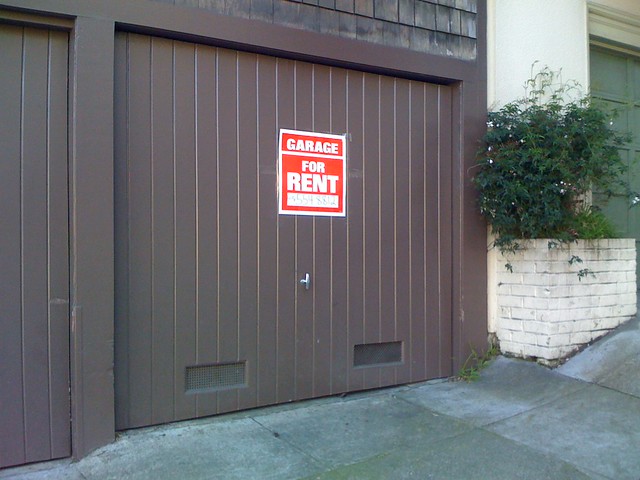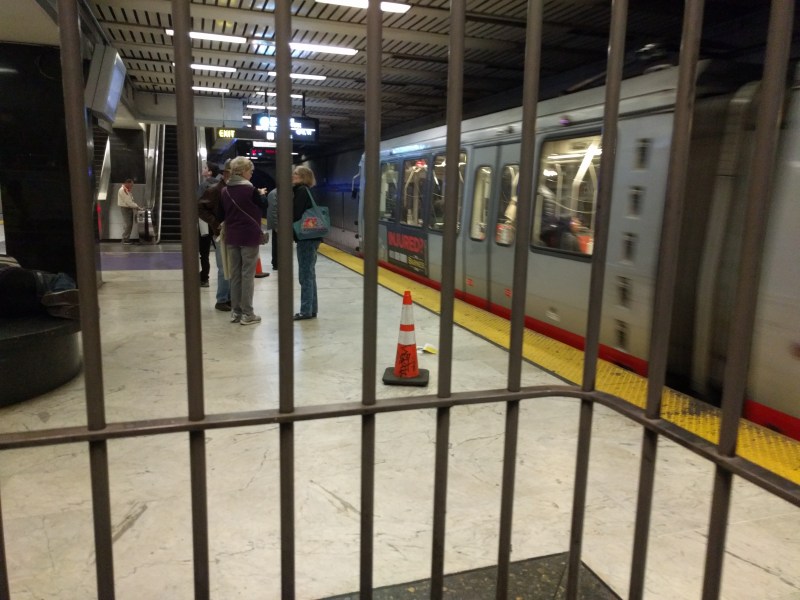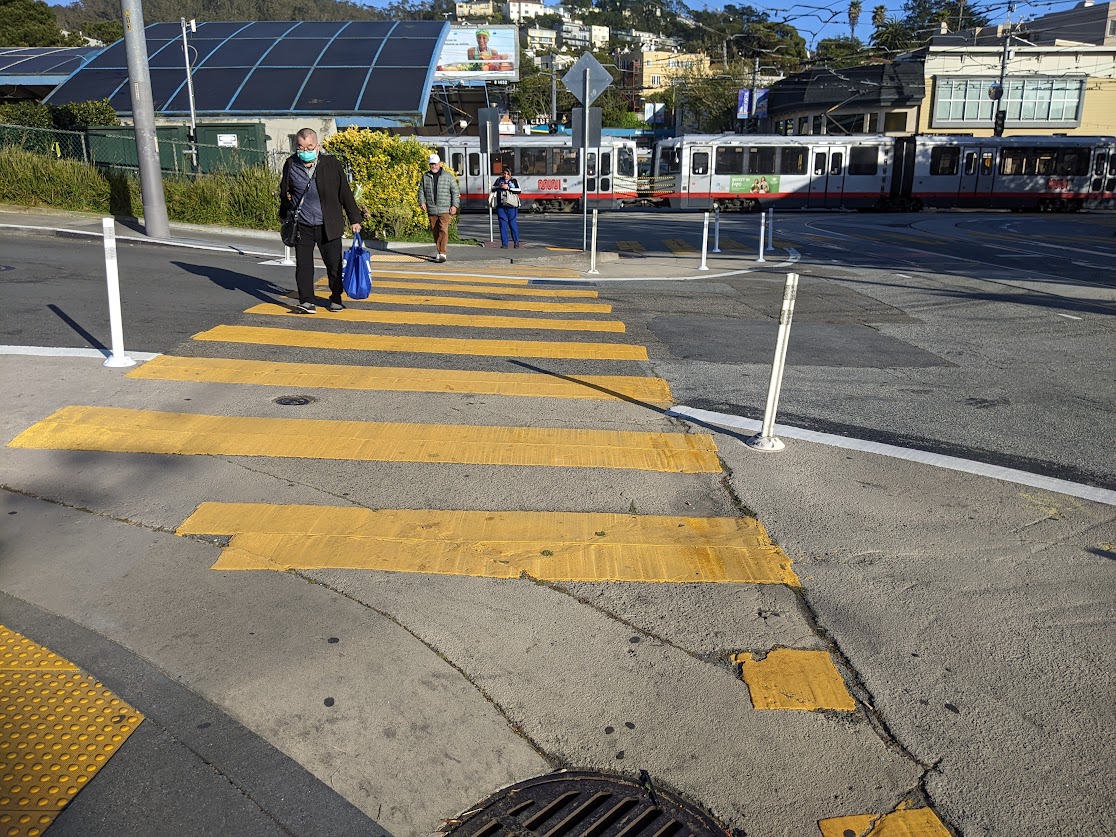Livable City: Expect More Traffic If Parking Rental Rule Is Changed
4:37 PM PDT on September 13, 2012
A proposal to allow residential car parking spaces to be rented out to anyone living in San Francisco has drawn fire from livable streets advocates who say it would encourage more car commuting and discourage property owners from converting parking spaces to housing units.
The proposal is part of legislation [PDF] headed to the Board of Supervisors on Tuesday. The provision would remove an existing requirement that anyone who rents a residential parking space live within 1,250 feet of it, opening such spaces up to car owners citywide. The change would apply to buildings with five or fewer parking spaces, clearing the way for residential buildings near workplaces to be used, essentially, as commuter parking. It's worth noting that 70 percent of downtown rush hour driving is done by SF residents, according to the SF County Transportation Authority.
"Those spaces would no longer be residential spaces. We're changing the use of them entirely," said Livable City Executive Director Tom Radulovich. "Five [spaces] or fewer is pretty much every residential parcel in this city... We're a city of small apartment buildings."
Supervisor Scott Wiener, who introduced the ordinance, said the current limit is impractical to enforce, and that allowing property owners to rent parking spaces to a broader market would make it easier to "unbundle" them from apartment rentals.
The larger part of the legislation, which is meeting with little opposition, would reform payment procedures for a parking tax that has gone almost completely uncollected on non-resident rentals since it was put in place in the 1970's. The entire bill was passed by the Planning Commission and the Board of Supervisors Budget and Finance Committee within the last week.
In an email to the Board of Supervisors, Radulovich argued that removing the 1,250-foot rule would go against the city's policies which "maintain that existing neighborhood parking should be prioritized for residents and for local businesses, and that parking policies should discourage drive-alone commuting in favor of sustainable transportation modes." His statement reads:
The objectionable provision of this ordinance, opening residential areas to commuter parking, is a major, and unwelcome, shift in city policy. This policy change was not vetted with the SFMTA or the other transportation advocates and stakeholders who helped formulate existing policy. This new provision will have many negative effects in neighborhoods, and citywide, including:
- It will encourage in-commuting via automobile. Increasing automobile commuting has various negative effects, including increased congestion, delays to Muni, increased danger to pedestrians and cyclists, increased air pollution and greenhouse gas emissions, and slower, more expensive goods movement for businesses.
- It will allow commuters to compete with area residents for parking spaces. This will drive up the cost of neighborhood parking for residents, making it unaffordable to many. Opening neighborhood parking to commuters will increase demand for street parking, which is important not only to residents, but to local businesses.
- It will discourage the conversion of parking not needed for area residents to housing. In a city critically short of housing, but reticent to increase heights, [floor area ratios], or density, existing building envelope is a resource that should be conserved for housing or job-creating uses, not commuter parking. We desperately need housing, especially in neighborhoods adjacent to downtown, and this provision would set up a powerful economic disincentive not to convert excess spaces to residential uses, shared residential parking as permitted by the code, or neighborhood-serving non-residential uses.
AnMarie Rodgers of the planning department told the Planning Commission that her agency doesn't expect the change to result in significant increases in car commuting, since it would only apply to small buildings. Some planning commissioners and supervisors agreed, saying that the current limit seems to be mostly unknown and unenforced anyway, meaning these types of rentals may already be common. Supervisor Carmen Chu said car commuters who park on the street next to light rail stops in neighborhoods like the Sunset seem to be a larger problem.
The 1,250-foot rule was instituted in 2008, before which parking spaces could only be rented by building residents. Livable City pushed for that change, said Radulovich, to legitimize the practice of renting to neighbors, since it allowed more flexible use of residential parking spaces without opening them up to commuters. However, he said Livable City was not consulted on the change included in Wiener's proposal.
The rest of the bill is aimed at reforming an "unbelievably difficult" process for small property owners to pay a tax on residential parking, said Wiener. Under current law, he said, a small building owner must clear the same hurdles as a commercial parking garage operator to pay the tax (including paperwork, fingerprinting, and installing equipment to count cars entering the garage), and its existence is virtually unknown to tenants and property owners.
As the city treasurer looks to start collecting the parking tax, proponents said the ordinance would increase compliance by making the payment and reporting process easier for building owners with five or fewer parking spaces. The treasurer would collect no more than two years worth of unpaid parking taxes, and property owners would get a six-month amnesty period to start paying. If approved, the ordinance would go into effect at the start of 2013.
Stay in touch
Sign up for our free newsletter
More from Streetsblog San Francisco
Commentary: Make Bay Area Transit Seamless as Condition of New Funding
SFMTA Starts West Portal Outreach
Agency presents plans to block traffic from crossing in front of the train station





